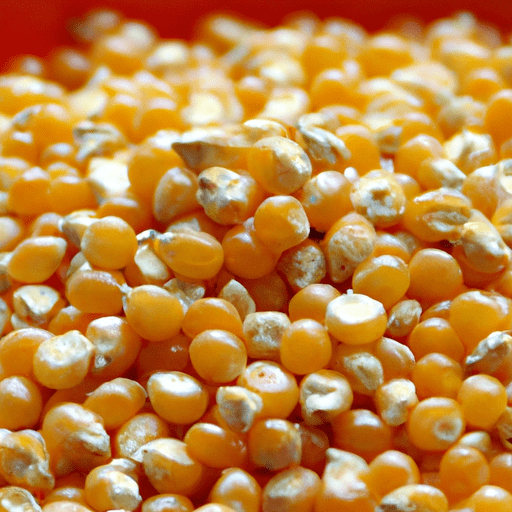Corn Cereal: A Crunchy and Versatile Foodie Favorite
Corn cereal, a classic breakfast option loved by many, offers a delicious combination of nutrition and taste. With its golden hue and satisfying crispy texture, it is no wonder why it has become a staple in households worldwide. In this blog post, we will explore the delightful world of corn cereal – its origins, its uses in cooking, its nutritional benefits, and some intriguing facts that will make you appreciate this humble grain even more.
Taste and Texture:
Corn cereal is known for its light and crispy texture that bursts with flavor in every bite. When combined with milk, it retains its crunchiness without turning into a soggy mess, allowing for a delightful morning bowl of cereal. The natural sweetness of corn adds a pleasant touch, making it appealing to both children and adults alike. Whether enjoyed with a sprinkle of sugar, a handful of fresh berries, or just as it is, corn cereal provides a satisfying breakfast experience.
Common Uses in Cooking:
Beyond the breakfast bowl, corn cereal is a versatile ingredient that can enhance various dishes and add a delightful crunch. Crushed corn cereal makes for an excellent coating for chicken tenders or fish, providing a crispier and more flavorful alternative to traditional breadcrumbs. A generous handful of corn cereal can also add a unique touch to salads, granola bars, and even homemade trail mixes. With its mild flavor profile, corn cereal seamlessly complements both sweet and savory creations, making it a beloved ingredient in the culinary world.
Nutritional Value:
Corn cereal is more than just a delicious morning treat – it also packs a nutritional punch. It is typically fortified with essential vitamins and minerals, such as iron, zinc, B vitamins, and folic acid, making it a valuable addition to a balanced diet. Additionally, many corn cereals are now available in whole grain options, providing high fiber content that supports healthy digestion and overall well-being. However, it is important to read the labels, as some varieties may have added sugars or artificial flavors. Opting for less processed options and pairing corn cereal with fresh fruits and low-fat milk can maximize its nutritional value.
Interesting History and Facts:
Corn cereal has a rich history that dates back centuries. It was first introduced to the world in the late 19th century, emerging as a result of efforts to promote corn consumption. The development of corn cereal provided an alternative to traditionally wheat-based products, accommodating those with wheat allergies or sensitivities. Since then, corn cereal has gained popularity worldwide, shaping breakfast routines and becoming a pantry staple in countless households.
Did you know that corn cereal was initially created by accident? In 1894, a group of researchers accidentally left a pot of boiled wheat farina out overnight. The next day, instead of investigating the spoiled wheat, they decided to run it through a set of rollers anyway. The result? A sheet of flakes that later became the foundation for corn cereal as we know it today. It goes to show that some of the best creations come from unexpected discoveries!
In conclusion, corn cereal has come a long way since its accidental creation and has carved its place on breakfast tables worldwide. With its delightful taste, crunchy texture, and versatility in cooking, it remains a beloved pantry staple. Whether enjoyed simply with milk or used as an ingredient in flavorful recipes, corn cereal continues to charm our taste buds while providing essential nutrients. So, the next time you pour yourself a bowl of corn cereal, take a moment to savor its rich history and savor the legacy of this humble grain.
Origin of Corn Cereal:
- Corn cereal is made from corn, a cereal grain that was first domesticated by indigenous peoples in Mesoamerica around 10,000 years ago.
- The cultivation and consumption of corn spread throughout Central and North America, becoming a staple food in many Native American cultures.
Common Uses:
- Corn cereal is primarily consumed as a breakfast food.
- It can be eaten on its own with milk or yogurt, or used as an ingredient in various recipes like granola bars, cookies, and muffins.
- Corn cereal is also often used as a topping for desserts like ice cream or fruit parfaits.
Nutritional Benefits:
- Corn cereal is a good source of carbohydrates, providing energy to the body.
- It contains dietary fiber, which aids in digestion and helps maintain bowel regularity.
- Corn cereal is often fortified with vitamins and minerals, such as iron, niacin, and thiamine, which are important for overall health.
Unique Properties and Historical Significance:
Corn cereal is known for its crunchy texture, which is achieved through a process called extrusion. This involves forcing the corn dough through a machine that shapes and cooks it into the desired shape.
In the early 20th century, corn cereal became popularized by brands like Kellogg’s and General Mills, who developed various flavored and shaped corn cereal products.
Corn cereal is often associated with iconic characters such as Tony the Tiger (Frosted Flakes) and Snap, Crackle, and Pop (Rice Krispies), which have been used in advertising campaigns for many years.
Corn cereal has historical significance as it played a crucial role in the development of breakfast cereals and changed the way people consumed breakfast, providing a convenient and quick option compared to traditional cooked breakfasts.




Use the share button below if you liked it.
It makes me smile, when I see it.